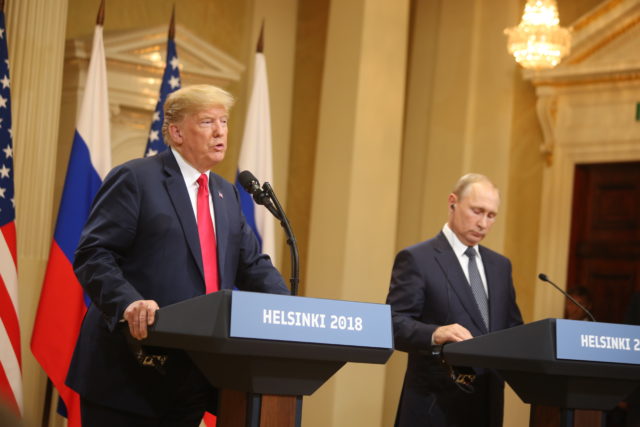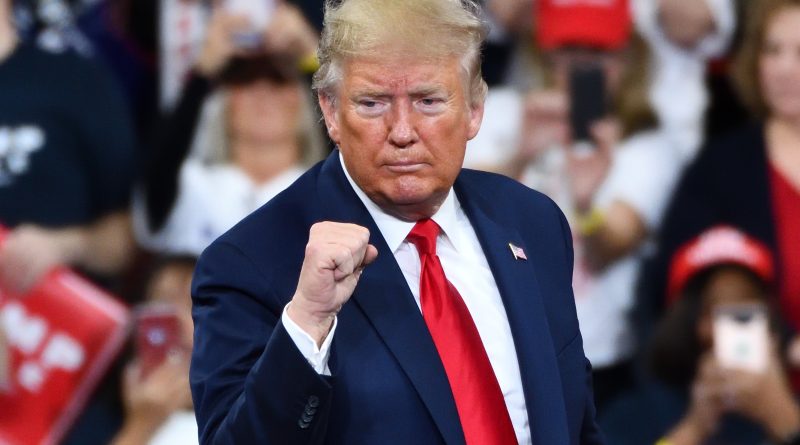Will America’s relations with its adversaries improve under a second Trump administration?
In the nearly four years President Joe Biden has been in office the world has become a more dangerous place than at any other time since the height of the Cold War in the 1960s.
In Europe, the war between Russia and Ukraine has not only cost tens of thousands of lives but also threatens a showdown between NATO and Moscow that could very well lead to the use of nuclear weapons and by extension the end of the world.
Russia recently announced a change to its nuclear doctrine to lower the threshold for the use of nuclear weapons. Though U.S. officials said they were not surprised by the announcement, it came a day after the Biden administration gave the green light for Ukrainian forces to use U.S.-made long-range tactical missiles against targets inside Russia.
Russia, which is being aided in the conflict by North Korean troops, responded by launching a hypersonic missile with multiple warheads against a target in Ukraine. Such a weapon has never before been used in combat.
In the Middle East, the war between Israel and Iranian-terrorist proxies Hamas and Hezbollah continues to brew risking an all-out regional conflict as Iran is said to be developing nuclear weapons and has already exchanged direct fire with Israel.
The conflict began on Oct. 7, 2023, after a deadly terrorist attack that claimed the lives of more than 1,200 Israelis with hundreds more being held hostage. Even with the news of a ceasefire agreement between Israel and Hezbollah peace in the region still seems uncertain.
In Asia, China continues to conduct military exercises off the coast of neighboring Taiwan, potentially threatening the territorial integrity of that nation. China’s trade policies, which consist of dumping cheap products into Western markets, continue to threaten a trade war with the U.S.
Biden will leave office in less than two months and former President Donald Trump will return to the Oval Office for a second non-consecutive term, the first president to do so since Grover Cleveland in 1893.
What happens then?
During Trump’s first term in office, U.S. relations with Russia slightly improved, Iran’s economy was nearly decimated by sanctions, Israel made peace with several of its neighbors, and the U.S. and China engaged in a limited trade war via tariffs.
Trump has said he believes he will be able to bring a swift end to both the war in Ukraine and the war in the Middle East.
So, what can we expect in a second Trump administration? Will the world be more or less safe?

U.S. relations with Russia
“The only chance for World War III is an errant missile from Russia hitting a NATO ally—that could happen now or at any moment, no matter who is in the Oval Office,” said Harry Kazianis, Senior Director of National Security Affairs at the Center for the National Interest.
“For now, as long as Trump works to end the conflict there and not escalate tensions any further, I think there is a good chance to end the fighting on terms all sides can live with. That does not mean a peace treaty, but a Korean war ending where no side can really claim victory.”
Benjamin Zajicek, an assistant professor of history at Towson University who studies the history of psychiatry in the USSR, said the war in Ukraine will probably come to an end “within the next year or two” because the Trump administration is likely to reduce the amount of funds and weapons going to Kyiv.
“At minimum, this will mean some sort of armistice where Russia agrees to stop fighting Ukraine, Ukraine agrees to stop actively fighting Russia, but Ukraine doesn’t acknowledge the legitimacy of Russia’s annexation of Crimea, Donetsk, Luhansk, etc. I think it’s not unlikely that Ukraine will be forced to sign a deal formally ceding its claims to Crimea, and probably the rest.”
Zajicek said it is unclear whether Russia will continue to threaten its neighbors.
“The big question then will be what Putin’s true goals are, and I certainly don’t know. My hope is that he will genuinely be appeased if his current territorial claims are agreed to. My fear is that he will not be appeased in the least – he will see an opportunity in the weakness of Ukraine and of the USA’s support for Ukraine.
“In that case, he will start the process all over again with further attacks on Ukraine, Moldova, and other border regions, as well as supporting and encouraging existing internal divisions. Trump is clearly someone who thinks of international relations in very transactional terms – it seems like an ideal environment for Putin to make deals with Trump which Trump can claim as victories while giving Putin carte blanche to press additional claims on Ukraine.”
Matthew Fehrs, an associate professor of political science at St. Mary’s College of Maryland, like Zajicek, said U.S. support for Ukraine is likely to weaken under a Trump administration.
“Trump has been quite clear that his administration will be much less supportive of Ukraine than Biden. Further, many congressional Republicans are increasingly skeptical about providing more aid. Any negotiations entered into in the near future are likely to substantially favor Russia.”

Wars in the Middle East
“Israel will continue to degrade and destroy Hamas and Hezbollah to the point of ensuring they are no real threat for at least 5 years—a mow-the-lawn type strategy that wins the war but does not completely destroy these groups,” Kazianis said. “Trump will take that as a win and rearm Israel to the point that they will have even more conventional military dominance over these adversaries that hopefully they will be deterred from future attacks.”
“As for Iran, Trump will unleash every possible sanction against Tehran and do all he can to limit any oil exports, just like he did years ago. That strategy damaged Iran’s economy and went a long way to containing their aspirations. There will be no hardline version of a new JCPOA under Trump, and Tehran still has a shot at getting nuclear weapons. However, Iran’s overall position in the region will degrade significantly.”
Daniel Pipes, who is president of the Middle East Forum, agreed.
“I try to distinguish between what Donald Trump just talks about and what he will actually do. I expect that radically changing U.S. policy toward the Islamic Republic of Iran fits the latter category. That means on the one hand much more support for Israel as it fights Tehran’s agents such as the 3Hs (Hamas, Hezbollah, Houthis) and even the possibility of American forces attacking the Iranian nuclear infrastructure.”
Fehrs said Trump is likely to give Israeli Prime Minister Benjamin Netanyahu a freer hand in dealing with the Palestinians.
“The mild criticisms the Biden Administration levied against Netanyahu’s government are unlikely to resurface with Trump, as he has been explicit in his open-ended support for Israeli actions.”
Noor Zehra Zaidi, an assistant professor of history at the University of Maryland Baltimore County (UMBC), echoed similar sentiments.
“Trump’s incoming administration appears more inclined to give Israel leeway in pursuing accelerating settlement development or even annexation of the West Bank, as reiterated recently by Smotrich. However, in the first three years of the Biden administration, they made no change to previous Secretary of State Mike Pompeo’s determination that Israeli settlements in the West Bank were not inconsistent with international law. It is not apparent that the Biden administration hampered settlement growth in any meaningful way. We can certainly expect more significant settlement building to continue unabated, as well as perhaps allowing Jewish civilians in Israel to purchase land in the West Bank.
“However, the fate of the West Bank will equally be tied to internal Israeli dynamics. Support for complete annexation has fluctuated over the years. It is perhaps higher now than in the past, but there is also some internal opposition in Israel to a vast expansion of the settlement movement, questions about the war effort, and criticism of the more far-right elements of Netanyahu’s coalition. Will Israeli society choose to permanently occupy three million Palestinians in the West Bank and subject them to different and unequal laws for Jewish Israeli citizens? Arab states have mostly allowed the war in Gaza to unfold without exerting the levers of influence that they do have. Permanent annexation would be a different matter. How the international community chooses to enforce or to ignore completely in practice the recent ICC ruling may also factor into Israel’s calculations.”

(Image by David Mark from Pixabay) Image by David Mark from Pixabay
U.S. Relations with China
“Trump sees China as the great economic competitor and, once again, will treat it as such,” Kazianis said.
“Trump will of course build up forces in the region to deter Beijing over Taiwan or in the South China Sea, but I see Trump doing all he can to convince U.S. businesses to reshore their operation back in America and lift exports to the U.S. That won’t be easy, and I am sure he will use tariffs and tough talk to try to achieve his goals. China’s rise will be in question when Trump leaves office, as these policy positions should. But America will be in a more dominant position in Asia, especially at a time when China’s economy is on the ropes.”
“We can certainly expect further tariffs against China, particularly since these are likely to receive bipartisan support,” Fehrs said.
“Additional tariffs will likely serve as a starting point for future negotiations with the Chinese over their trade policies, as they did during Trump’s first term. It will be interesting to see which sectors and companies are able to avoid tariffs due to lobbying the new administration. Trump has also promised broad tariffs, including against goods from European allies that are likely to be significantly more controversial than those levied against China.”
Fehrs said Trump’s tariff plan might backfire on American consumers as goods go up in price.
“We have a pretty good idea of the impact of tariffs on American consumers: products will get more expensive. How much more and the number of products impacted are contingent upon how broadly Trump applies the tariffs. Other countries have already signaled that tariffs by the United States will lead them to impose their own, which will harm American exports and could lead Trump to reappraise this approach.”
Assessing what might happen with Taiwan under a Trump administration is somewhat difficult to do, Fehrs said.
“It is very hard to predict what the future will look like. The relatively isolationist stance of the incoming administration could embolden the Chinese, but the costs to China of an attack on Taiwan are quite high even with the U.S. on the sideline.”

Bryan is an award-winning political journalist who has extensive experience covering Congress and Maryland state government. His work includes coverage of the election of Donald Trump, the confirmation hearings of Supreme Court Justice Brett Kavanaugh and attorneys general William Barr and Jeff Sessions-as well as that of the Maryland General Assembly, Gov. Larry Hogan, and the COVID-19 pandemic.
Bryan has broken stories involving athletic and sexual assault scandals with the Baltimore Post-Examiner.
His original UMBC investigation gained international attention, was featured in People Magazine and he was interviewed by ABC’s “Good Morning America” and local radio stations. Bryan broke subsequent stories documenting UMBC’s omission of a sexual assault on their daily crime log and a federal investigation related to the university’s handling of an alleged sexual assault.

